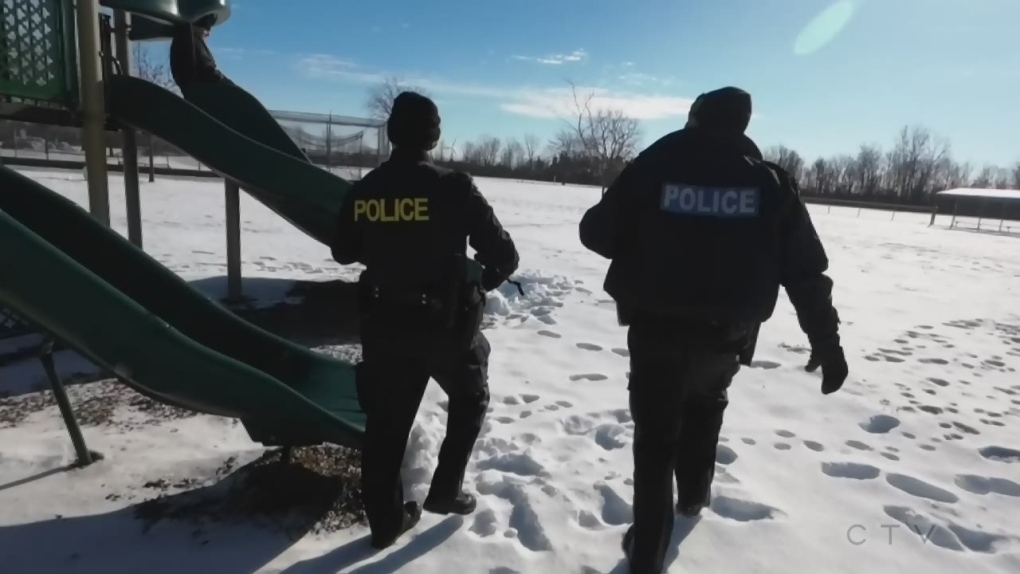Essex County OPP undergo training on 'Lifesaver' device to help locate missing persons
 Essex County OPP received 10 new Lifesaver Radio Frequency receivers in Essex County, Ont. on Tuesday, Jan. 31, 2023. (Bob Bellacicco/CTV News Windsor)
Essex County OPP received 10 new Lifesaver Radio Frequency receivers in Essex County, Ont. on Tuesday, Jan. 31, 2023. (Bob Bellacicco/CTV News Windsor)
Many people with autism and dementia tend to wander, the Essex County OPP now has 10 new devices to help find them.
“We really want people to be as independent as possible, but safe in their community as well,” said Rosemary Fiss, program manager for the Alzheimer’s Society Windsor Essex.
The organization helped buy 10 new Lifesaver Radio Frequency receivers.
Nine members of the Essex County OPP have been training this week on how to use the RF device.
“We certainly utilize this program to locate individuals in our community that are at risk to bring them home safer to their family as quickly as possible,” said detachment commander Angela Ferguson.
According to the Alzheimer's Society, six in 10 people with dementia will get lost at some point. Having a safety plan in place is important.
“This is a search tool, another tool we utilize that help our community members and help the caregivers have a bit of peace of mind to know we have another tool to locate them,” said Ferguson.
During an exercise the person at risk wore a transmitter that is registered with both the OPP and Windsor Police Service.
“This scenario was a child with autism departed from school and he never returned,” said const. Rob Belanger.
He and his partner were led to a park next to the Woodslee Library.
“As we got closer and walked, we switched from long range to a medium range and that told us we were in the right area,” Belanger explained.
The RF signal can be picked up easier than a GPS device.
“They might be found in a shrub or in a culvert or under a front porch so having the locating device is really helpful,” said Fiss.
It took officers about 10 minutes to find the transmitter, which was located in a play area behind the library.
Time is of the essence according to Fiss.
“Fifty per cent of people who are not found within 12 hours have an extreme risk of health as well so we really want to find people quickly,” she said.
Anyone who signs up for this project has an initial cost of $200 and a refundable security deposit of $100. It then costs $20 per month for registration.
The Windsor-Essex branch of the Alzheimer's Society helps fund the project locally every year.
“Project Lifesaver allows us to keep family members in their homes longer and to be with their families longer without having to go into a nursing home,” said OPP const. Jacquie Winand-Bacon.
She says many lives have been saved since she helped bring the program to the province in 2005.
CTVNews.ca Top Stories

Israel gave U.S. last-minute warning about drone attack on Iran, Italian foreign minister says at G7
The United States told the Group of Seven foreign ministers on Friday that it received 'last minute' information from Israel about a drone action in Iran, but didn't participate in the apparent attack, officials said.
After hearing thousands of last words, this hospital chaplain has advice for the living
Hospital chaplain J.S. Park opens up about death, grief and hearing thousands of last words, and shares his advice for the living.
'It was all my savings': Ontario woman loses $15K to fake Walmart job scam
A woman who recently moved to Canada from India was searching for a job when she got caught in an online job scam and lost $15,000.
Families to receive Canada Child Benefit payment on Friday
More money will land in the pockets of some Canadian families on Friday for the latest Canada Child Benefit installment.
After COVID, WHO defines disease spread 'through air'
The World Health Organization and around 500 experts have agreed for the first time on what it means for a disease to spread through the air, in a bid to avoid the confusion early in the COVID-19 pandemic that some scientists have said cost lives.
American millionaire Jonathan Lehrer denied bail after being charged with killing Canadian couple
American millionaire Jonathan Lehrer, one of two men charged in the killings of a Canadian couple in Dominica, has been denied bail.
DEVELOPING G7 warns of new sanctions against Iran as world reacts to apparent Israeli drone attack
Group of Seven foreign ministers warned of new sanctions against Iran on Friday for its drone and missile attack on Israel, and urged both sides to avoid an escalation of the conflict.
BREAKING Iran fires at apparent Israeli attack drones near Isfahan air base and nuclear site
An apparent Israeli drone attack on Iran saw troops fire air defences at a major air base and a nuclear site early Friday morning near the central city of Isfahan, an assault coming in retaliation for Tehran's unprecedented drone-and-missile assault on the country.
Ottawa to force banks to call carbon rebate a carbon rebate in direct deposits
Canadian banks that refuse to identify the carbon rebate by name when doing direct deposits are forcing the government to change the law to make them do it, says Environment Minister Steven Guilbeault.































